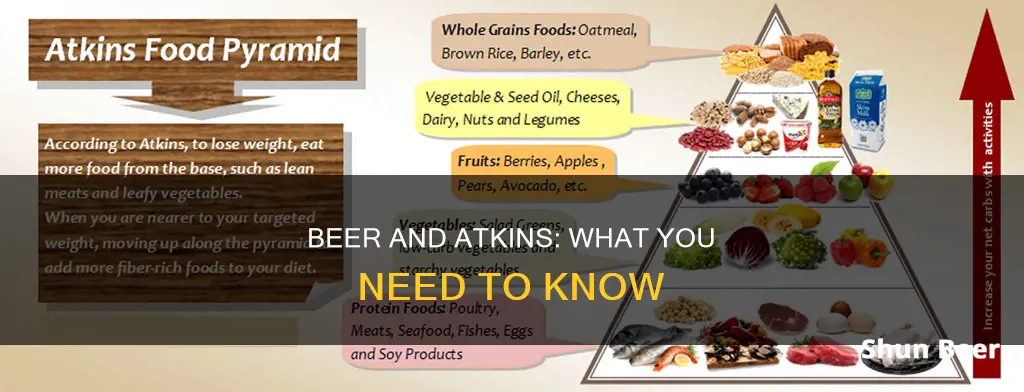
The Atkins diet is a low-carb, high-protein, and high-fat diet that restricts carbohydrate intake. While on this diet, can you drink beer? The short answer is yes, you can drink alcohol, including beer, on the Atkins diet. However, there are a few things to keep in mind. First, alcohol is not recommended during the induction phase of the diet, as it can hinder weight loss. If you are in the weight loss, pre-maintenance, or maintenance stages of the diet, alcohol is permitted in moderation. It's important to choose drinks with lower carbohydrate content, as your body will burn alcohol before fat, which can slow down weight loss. Beer contains more carbs than wine, with 13 grams of carbohydrates in a typical serving. Spirits have virtually no carbohydrates, but be cautious of mixers that may contain hidden carbs. Overall, while you can drink beer on the Atkins diet, it's important to consume it in moderation and be mindful of the potential impact on your weight loss goals.
What You'll Learn
- Beer has more carbs than wine, so it may slow down weight loss
- Alcohol is not recommended during the Induction phase of the Atkins diet
- Spirits have zero carbs but mixers like juice or soda may contain hidden carbs
- Drinking alcohol may cause your blood sugar to spike and increase sugar cravings
- Drinking alcohol will slow down weight loss as your body prioritises burning alcohol over fat

Beer has more carbs than wine, so it may slow down weight loss
Beer, ale, port, and sweet sherry are all high in carbohydrates, while wine generally has a moderate carbohydrate content. Dry white wine has a much lower carbohydrate content than other types of wine. Spirits generally have virtually no carbohydrates, but it is important to be careful with mixers, as juice or soda can contain hidden carbs.
The Atkins diet is a type of diet plan that restricts carbohydrate intake and follows a high-protein and high-fat diet. The key to weight loss on the Atkins diet is to limit carbohydrate consumption and increase the intake of protein and healthy fats. This helps to flip the body's metabolic switch from burning carbs to burning fat.
When it comes to alcohol, the Atkins diet recommends refraining from drinking during the first two weeks while the body is adapting to a new metabolism of fat burning. After this initial period, alcohol can be introduced in moderation, but it is important to remember that the body will burn alcohol before fat, which could slow down weight loss.
Beer typically has 13 grams of carbohydrates in a serving, while wine usually has 3-5 grams. Cocktails can also be high in carbohydrates due to sugary mixers. It is important to count the carbohydrates in alcoholic drinks into your daily carb count if you are following the Atkins diet.
While it is possible to include alcohol in the Atkins diet, it is important to be mindful of the carbohydrate content and overall impact on weight loss.
Beer and Cefuroxime: Is It Safe to Drink?
You may want to see also

Alcohol is not recommended during the Induction phase of the Atkins diet
The Induction phase is also when your body is adapting to a new metabolism of fat burning. Introducing alcohol during this time is not recommended because your body will burn alcohol before fat, potentially slowing down your weight loss. It is best to wait until you have settled into the Ongoing Weight Loss (OWL) phase before adding alcohol.
If you do choose to drink alcohol during the Induction phase, it is important to be aware that not all alcoholic drinks are equal in terms of carbohydrate content. Beer, ale, port, and sweet sherry are all high in carbohydrates, while wine generally has a moderate carbohydrate content, and spirits have virtually no carbohydrates. However, it is important to be cautious of mixers, as juice or soda can contain hidden carbs.
Even if you opt for a low-carb alcoholic beverage, alcohol can still impact your weight loss efforts. Alcohol has calories, with an average of 7 kcal per 1 gram, and it can also cause your blood sugar to spike, leading to increased sugar cravings. Additionally, drinking alcohol can lead to snacking, and if you're not careful, you can quickly kick yourself out of ketosis.
While alcohol is not recommended during the Induction phase, it is permitted in moderation during the later stages of the Atkins diet: Ongoing Weight Loss, Pre-maintenance, and Maintenance. However, even during these stages, alcohol may hinder your weight loss, and it is recommended to restrict or cut out alcohol if you are finding it hard to lose weight or are regaining weight.
Beer and Anxiety Medication: Safe Mix?
You may want to see also

Spirits have zero carbs but mixers like juice or soda may contain hidden carbs
While on the Atkins diet, it is best to avoid alcohol during the first two weeks, also known as the Induction Phase, while the body adapts to burning fat. Alcohol is not recommended on the Atkins diet, but it is permitted in moderation during the On-going Weight Loss, Pre-maintenance, and Maintenance stages. However, if you are finding it hard to lose weight, it is best to restrict your alcohol intake or cut it out altogether.
If you do choose to drink alcohol, it is best to stick to beverages with fewer carbohydrates, such as spirits, which generally have zero carbohydrates. However, it is important to be cautious of the mixers that are used, as they may contain hidden carbohydrates. For example, mixers like juice or soda can contain hidden carbs and quickly turn a carb-free drink into a high-calorie drink. Instead, opt for low-carb mixers like diet soda, seltzer, diet tonic water, or powdered flavour packets to keep your carbohydrate intake low.
It is important to remember that alcohol contains empty calories and can impede weight loss by stimulating appetite and decreasing inhibitions, leading to increased food intake. Therefore, even low-carb alcoholic beverages should be consumed in moderation.
Beer and TruVision: A Safe Mix?
You may want to see also

Drinking alcohol may cause your blood sugar to spike and increase sugar cravings
Alcohol is not recommended on the Atkins diet, however, it is permitted in moderation during the Ongoing Weight Loss, Pre-maintenance, and Maintenance stages. If you are finding it hard to lose weight, it is recommended that you restrict your alcohol intake or cut it out altogether.
Alcohol can affect your blood sugar levels, causing them to rise or fall depending on how much you drink. Alcoholic drinks are high in sugar, which can cause your blood sugar to spike. This can take about 1-2 hours. Your body then releases insulin to bring your blood sugar levels down. Once your body has absorbed all the sugar it can from the alcohol, it will start to use up the sugar, decreasing your blood sugar levels.
Drinking alcohol can also increase your appetite, causing you to overeat and further increasing your blood sugar levels. It can also reduce your willpower, making it more likely that you will make unhealthy dietary choices. Alcohol can also interfere with the effectiveness of some oral diabetes medications.
If you are on the Atkins diet and choose to drink alcohol, it is recommended that you stick to drinks that contain fewer carbohydrates, such as spirits, light beer, or dry white wine. Beware of mixers like juice or soda, which can contain hidden carbs.
Drinking Beer After Donating Blood: What You Need to Know
You may want to see also

Drinking alcohol will slow down weight loss as your body prioritises burning alcohol over fat
Alcoholic drinks are often referred to as "empty" calories. This means that they provide your body with calories but very few nutrients. A 12-ounce can of beer contains around 155 calories, and a 5-ounce glass of red wine contains about 125 calories. Alcoholic drinks with mixers, such as fruit juice or soda, contain even more calories.
When you consume alcohol, your body prioritises burning it as a fuel source before burning anything else, including glucose from carbohydrates or lipids from fats. This means that the excess glucose and lipids are stored as adipose tissue, or fat. As a result, drinking alcohol can slow down your weight loss as your body prioritises burning alcohol over burning fat.
The liver plays a crucial role in metabolising fats, carbohydrates, and proteins. Excess alcohol consumption can lead to alcoholic fatty liver, which can damage your liver and affect how your body metabolises and stores carbohydrates and fats. This change in how your body stores energy from food can make losing weight more difficult.
Additionally, alcohol can affect your judgment and lower your inhibitions, leading to poor food choices and increased food intake. It can also negatively impact your sleep, causing sleep deprivation, which can disrupt the balance of hormones related to hunger, satiety, and energy storage.
If you are following the Atkins diet, alcohol is not recommended during the Induction phase. In the later stages of the diet, alcohol may hinder your weight loss progress. It is best to stick to alcoholic beverages with fewer carbohydrates, such as spirits, dry white wine, or light beer. However, it is important to remember that even these drinks contain calories and can impact your weight loss journey. Moderation is key, and it is recommended to limit alcohol intake or cut it out altogether if weight loss stalls.
Beer and Health: One Beer, Any Harm?
You may want to see also
Frequently asked questions
Beer is not recommended on the Atkins diet, especially during the Induction phase. Beer is high in carbohydrates. However, you can have alcohol in moderation during the On-going Weight Loss, Pre-maintenance, and Maintenance stages.
The four stages of the Atkins diet are Induction, On-going Weight Loss, Pre-maintenance, and Maintenance.
Spirits generally have zero carbohydrates, so drinks like Scotch, rye, vodka, and gin are acceptable. Light beer and dry white wine are also low-carb options. Avoid mixers like juice or soda, which are high in carbohydrates.







